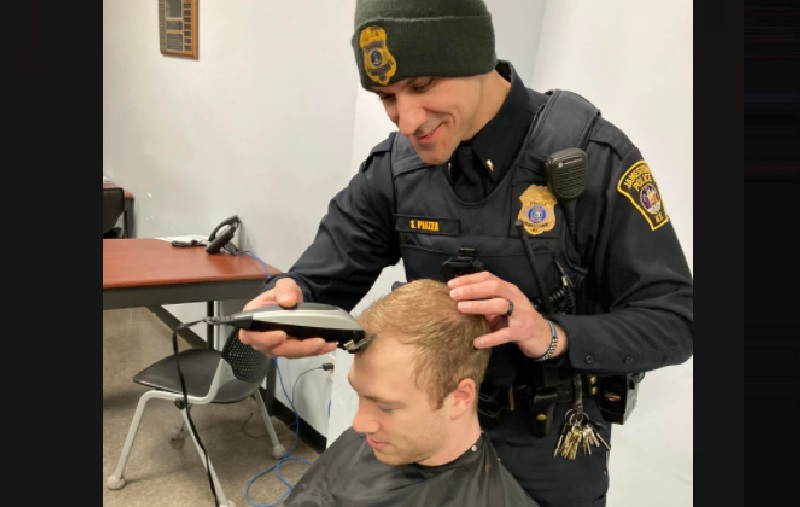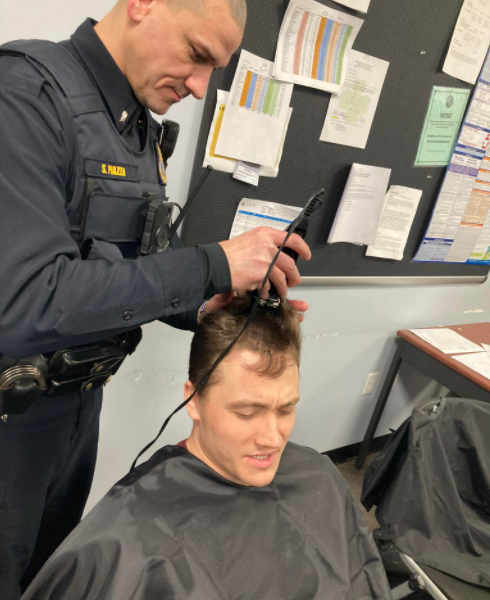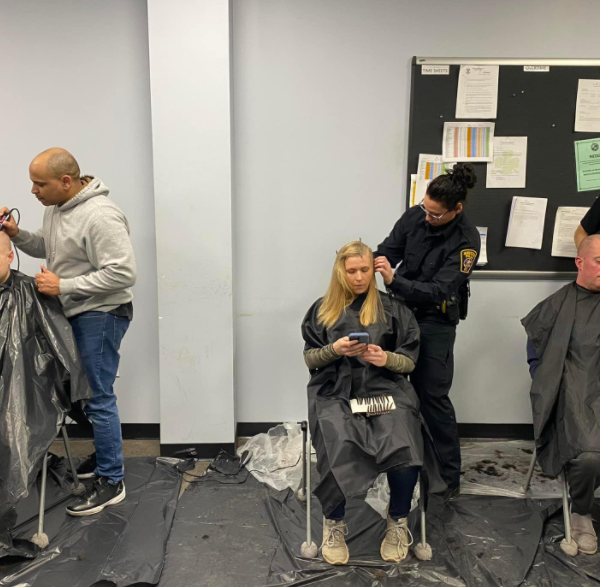
Although there are formal websites dedicated to monetarily supporting cops with cancer, which is self-explanatory in two distinct ways, a contingent of law enforcement officers with the Jamestown Police Department informally sought out shears and snipped away their coifs to show solidarity for one of their own: A cop with cancer, experiencing the effects of chemo.
Undergoing chemo is an inexplicable experience. The human body takes quite a hit from the chemical concoctions intended to reverse the horrible tide of neoplasia. Extreme nausea feels unshakable, despite the medications prescribed to counter the queasiness. One outwardly tell-tale sign of a cancer patient undergoing chemo is a hair-deficient scalp.
Some patients enduring chemo treatments opt for prosthetic hairpieces in the interim. Others go au natural, like a Jamestown cop who is the subject of our topic today.
Given the altruistic nature of police work, and the traditional serve and protect credo exemplified in many ways, cops continue to come up with ways to give of themselves. For a fellow officer, members of the Jamestown force sat down and used their heads, literally. In this case, the wearing of many hats mantra includes barber.
Per a Jamestown PD post: “While walking this Earth, everyone you meet or come into contact with is facing a battle that you will likely never know about, understand, or experience. In the event that you do know about their battle, you may never know exactly what it is like for them.” That sounds like what cops universally know, and the Why among all police officers.
In Jamestown, though, it is deeply personal. They continued… “There are many reasons for not having hair on your head. It could be a personal preference, a fashion statement, genetics, hormonal changes, a medical condition, alopecia, grooming, or just a part of getting older. Another reason is chemotherapy.
“If you live in or visit Jamestown and have the opportunity to see, meet, or talk to a Jamestown Police Officer, you may notice many of us currently have our heads shaved. That’s because one of our own is currently fighting one of those battles that many of us will never experience—cancer. And although we may never truly understand what it is like, cancer is a battle that no one should ever have to fight alone.
“You should tell people how important they are to you. Always.”
And they did exactly that, in the form of a gesture…a show of solidarity and support.
A large portion of the police force had their heads shaved and then turned the tables, taking turns with the shears and buzz-cutters and barber bibs.

(Photo courtesy of the Jamestown Police Department.)
It is a fabulous verse to hear people say they have no idea what it is like to experience the impacts of chemotherapy. Cancer-afflicted patients know differently.
Throughout the course of chemo treatments, the fragility of life is highlighted. How much the body can take physically does not mean one’s emotional endurance is coated with Teflon.
It can feel as though life is seeping. People in your circle endeavor to prop you up when you have significantly depleted energy to do things for yourself. It is a bittersweet life experience. I’ve been there, several times having to put my law enforcement career to the side.
Several bouts of radiation treatments knocked me significantly. My police family did everything imaginable to ensure I was reminded of self-worth; God’s good graces appeared in the forms of blue attire pinned with tin.
Moreover, my family was well taken care of when I had zero ounces of physical energy or mental clarity. Even with all the perilous encounters as a cop, cancer made me feel so vulnerable. Realizing my police family was caring for my blood family echoed my career choice, and with whom I was co-reliant for life on- and off-duty.
Running out the clock due to several surgeries and cancer treatments of varying sorts (never heard of maggot therapy but the little buggers went to town on necrotic tissue which generated after failed surgical endeavors), my accumulated time on the books to maintain my household economy dwindled down. A major predicament exacerbating a larger one. I worried, needlessly.
Unbeknownst to me, the entire police force pitched a plan to “donate” vacation time to my “bank,” thus enabling a salary to continue while I wrestled with cancer impacts. But it wasn’t only cops. I would eventually come to learn that fire department personnel, sanitation workers, public works staff, elected officials, and members of several churches where I worked security on off-duty days…all came together to make it that much more bearable, survivable.
As a policeman, I met many people who were suffering in silence, feeling solo, isolated, in despair. For each of these hard-hit citizens, it was about listening, being there, investing time. For many, cops are the always-there elixir. There are calls that have less to do with policing and everything to do with humanity.
I was elated to oblige those who beckoned.
Boiling it down to the team concept, the Jamestown cops embrace the depth of pain inherent in a cancer diagnosis.

(Photo courtesy of the Jamestown Police Department.)
Internally, the woeful dynamics of such tragic news automatically default to pulling together and doing whatever is necessary to sustain quality in life, as optimally as possible.
I suspect the cancer-fighting Jamestown police officer is in the same mindset. Conversely, Jamestown cops exemplified the solidarity so endemic in police culture. As described above, it resonated with me and my loved ones when we needed it most. Living without expectations, my nucleus made it through…thanks to public safety ambassadors.
Before my cancer journey robbed me of my career as a cop, one of my colleagues ran the same gambit of bleakness and uncertainty. Detective Anita Bridges was diagnosed with cancer. Late-stage, the oncology team prescribed chemotherapy posthaste.
Det. Bridges endured the entirety of her chemo regimen. Her fellow brother and sister cops observed the drastic changes inherent in the human form infused with chemicals. Hair fallout was rather swift, accompanied by frailty and meekness.
Taking turns, our PD’s sworn and civilian personnel always made sure at least one police member was there to support and cater respite for her blood family.
One day, when it was my opportunity to transport her to/from chemo at the cancer hospital, she quietly did something which was the proverbial picture painting a thousand words. Lacking energy, she slowly raised her hand to one of mine gripping the wheelchair’s handles. She sort of feather-touched the top of my hand, gently patted, and scantly forged a smile.
Giving her whatever I could muster, that was the last gesture for which I was on the receiving end. I just didn’t know it at that moment. We “got through another day,” as she was prone to score for the books. Det. Bridges succumbed to her cancer soon after.
There’s one thing about cops, especially when the situation appears bleak: they’ll make you feel like you’re holding all the aces…a helping hand when you need it the most.
First responders respond first…sometimes without ever even hitting the streets.